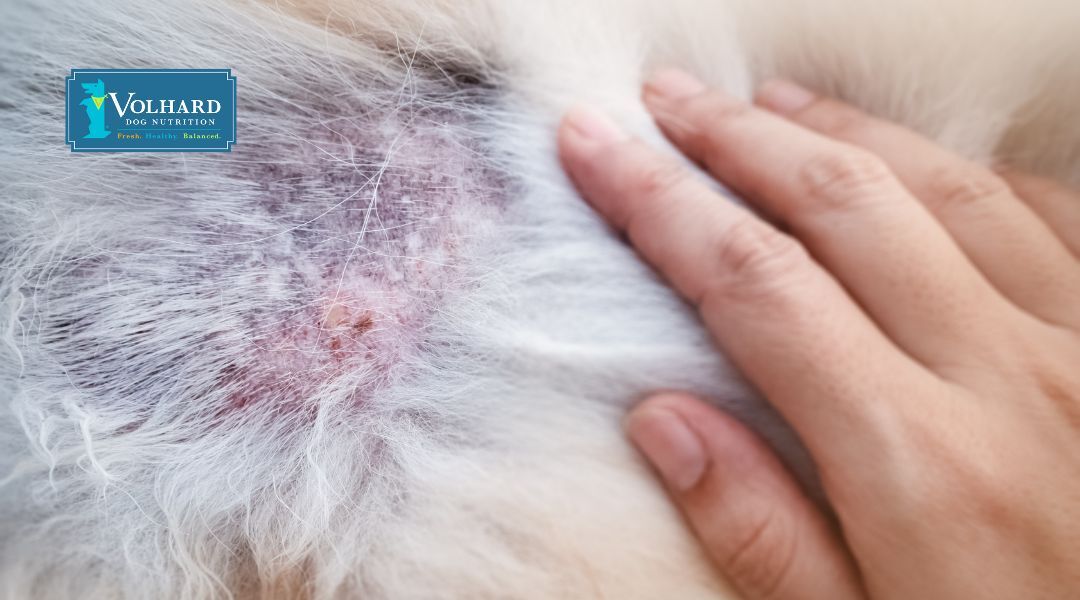Itchy and Sneezy: Decoding Your Dog's Spring Allergy Symptoms and Healing Solutions
Posted by Volhard Dog Nutrition on Apr 9th 2025
Ah, springtime! The sun is shining, the flowers are blooming, and the air is fresh. But for allergy sufferers—both two-legged and four—it’s also the season of sniffles, sneezes, and relentless itching.
Luckily, we have remedies to help us enjoy the outdoors without itchy eyes and irritated sinuses.
But what about your furry friend?
Seasonal allergies can make your dog miserable if left unchecked. The good news? With a little know-how, you can spot the signs early and help your pup find relief before allergy season takes over!
The Difference Between Seasonal and Food Allergies
It’s easy to mistake a seasonal allergy for food sensitivity since both can lead to itching and irritation. The key difference lies in when and how symptoms appear:
- Seasonal allergies: They usually flare up during certain times of the year, particularly in spring and fall, when pollen, mold, and other environmental allergens are abundant. Symptoms primarily affect the skin, leading to itchiness, red paws, and ear infections.
- Food allergies: Unlike seasonal allergies, food allergies aren’t limited to specific seasons. If your dog has a food allergy, symptoms will persist year-round, and in addition to itchy skin, they may also experience chronic digestive issues like vomiting or diarrhea.
Sometimes, these are ingredients and/or environmental allergens your pet is intolerant to. These are not allergies but something that, for whatever reason, is causing inflammation in the body. Usually, the inflammation is coming from a leaky gut. Intolerances can change as the gut heals.

4 Common Environmental Triggers for Dog Allergies
Spring is full of potential allergens that can wreak havoc on your pup’s immune system. Some of the most common culprits include:
- Pollen: Trees, grass, and weeds release tiny pollen particles into the air, triggering allergic reactions.
- Mold spores: Damp environments encourage mold growth, leading to respiratory and skin irritation.
- Dust & mites: These tiny particles lurk in carpets, bedding, and outdoor spaces, causing allergic flare-ups.
- Grass & weed seeds: Sticking to fur and paws, these irritants can make dogs scratch and chew their skin excessively.

Spotting the Symptoms: How to Tell if Your Dog Has Allergies
- Itchy Skin: Does your dog seem extra scratchy lately? Excessive licking, chewing, or rubbing against furniture could mean their skin reacts to allergens. Atopic dermatitis, the medical term for dog skin allergy, can cause dry, flaky, or inflamed skin, leading to non-stop scratching.
- Red Paws: If your dog constantly licks or chews their paws, allergies could be to blame. Pollen, grass, and other irritants collect on the paws during walks, leading to redness, swelling, and discomfort. Over time, excessive licking can even cause painful sores or infections.
- Runny Nose/Eyes: Watery, red, or irritated eyes or runny noses are another sign of seasonal allergies in dogs. While some tearing or moisture is normal, excessive eye or nasal discharge could indicate that allergens irritate your pup—especially if they’re frequently pawing at their face.
- Ear Infections: Frequent ear infections are a lesser-known symptom of dog allergies. If your dog’s ears smell bad, seem swollen, or have a lot of wax buildup, it might be due to an allergic reaction. Dogs with floppy ears (like Golden Retrievers or Cocker Spaniels) are especially prone to allergy-related ear infections.
- Digestive Upset: While food allergies are the most common culprit behind tummy troubles, some dogs with seasonal allergies experience occasional vomiting, diarrhea, or loss of appetite. If your pup’s digestive issues appear only during certain times of the year, allergies could be the hidden cause.
The Link Between Allergies and Leaky Gut Syndrome
Leaky gut syndrome and allergies are deeply connected because both involve an overactive immune response. When a dog's gut is healthy, its intestinal lining acts as a protective barrier, allowing nutrients to pass through while keeping harmful substances out of the bloodstream.
When this barrier becomes compromised—due to poor diet, medications, stress, or toxins—it develops tiny gaps, or "leaks," allowing undigested food particles, toxins, and allergens to escape into the bloodstream.
This triggers the immune system to respond aggressively, treating these escaped particles as threats. Over time, this constant immune activation leads to inflammation and allergic reactions. Instead of tolerating common environmental triggers like pollen or dust, the immune system becomes hypersensitive, making allergy symptoms more severe.
A leaky gut makes a dog's immune system more reactive, turning mild allergies into chronic skin conditions, digestive issues, and recurring infections. Dogs with leaky gut syndrome are also more likely to develop food sensitivities, compounding their allergy problems.
You can help regulate the immune system, reduce inflammation, and lessen allergic reactions by healing the gut. A diet rich in whole, unprocessed foods, probiotics, and anti-inflammatory nutrients can support gut repair and strengthen the intestinal barrier, helping your dog better tolerate allergens.
Natural Solutions for Allergy Relief
When managing your dog’s allergies, instead of relying solely on medications like Apoquel, which can have side effects, a holistic approach that includes diet changes, gut health support, and natural remedies can provide lasting relief.

The Rescue Diet
One of the best ways to manage allergies is through diet; our Rescue Diet is designed specifically for dogs struggling with allergies, inflammation, and sensitivities.
This hypoallergenic, grain-free, gluten-free diet was created to support dogs with sensitive immune systems and has been tested to show anti-inflammatory benefits.
Switching your dog to the Rescue Diet for 6 to 8 weeks while following a gut-healing protocol can help reset their system, reduce allergic reactions, and improve digestion.
For some dogs, this diet can be a temporary solution during the healing phase, while for others, it may be a lifelong approach if it is used to manage their allergies.
Cooling and Neutral Proteins
Not all proteins are created equal—some can worsen inflammation, while others help calm the body. Dogs with allergies benefit most from cooling and neutral proteins, which are easier on the digestive system and help reduce inflammatory responses.
- Best proteins for allergies (cooling & neutral): Beef, bison, pork, white fish, duck, rabbit, and turkey.
- Proteins to use with caution (warm & hot):
- Warm proteins (may cause mild inflammation): Chicken, salmon, elk.
- Hot proteins (more likely to trigger inflammation & leaky gut): Goat, venison, lamb.

The 5 Essential Supplements in the Leaky Gut Protocol
The Leaky Gut Protocol by Adored Beast, supported by our expert Volhard team, targets the root cause of inflammatory disorders, which can lead to skin disease, allergies, and digestive problems. It includes five essential supplements to restore gut health and support overall healing.
1. Rebalancer – Detox & Reset
Modern dogs are often exposed to vaccines, medications, and environmental toxins that can leave lingering effects on their immune system. Rebalancer helps remove unwanted side effects from vaccinations without compromising their benefits. Detoxifying your dog’s gut allows the immune system to focus on healing rather than overreacting to allergens.
2. Liver Tonic – The Body’s Natural Filter
The liver filters toxins and regulates histamine levels, directly impacting allergic reactions. Liver Tonic supports healthy liver function, helping it regenerate cells, process allergens more effectively, and reduce inflammatory responses contributing to itching and irritation.
3. Healthy Gut – Probiotic Support for Digestion & Immunity
A healthy gut microbiome is essential for a strong immune system. Healthy Gut provides probiotics and digestive enzymes that promote better digestion, improve nutrient absorption, and support overall immune function. This helps reduce food sensitivities, chronic diarrhea, and inflammation-related allergies.
4. Gut Soothe – Healing & Yeast Control
When the gut lining is compromised, inflammation and yeast overgrowth can cause chronic itching, infections, and digestive upset. Gut Soothe contains soothing herbs and probiotics that help repair the intestinal lining, reduce inflammation, and fight yeast imbalances, leading to calmer skin and a stronger immune response.
5. Gut Seal – Strengthening the Gut Barrier
Leaky gut allows allergens and toxins to escape into the bloodstream. Gut Seal works to restore and tighten these junctions, preventing future leaks and creating a stronger, healthier digestive barrier. This means fewer allergic reactions and improved gut function over time.
Topical Remedies
Natural remedies can provide immediate relief while supporting long-term healing. Here are a few simple, practical solutions:
- Apple Cider Vinegar Spray: Apple cider vinegar is a natural antibacterial and antifungal that helps relieve itchy skin and prevents infections. Mix equal parts of water and apple cider vinegar, then lightly spray on affected areas (avoid open wounds).
- Bovine Colostrum: This powerful supplement helps balance the immune system and reduce allergic reactions. Colostrum contains antibodies and growth factors that repair the gut lining, support healthy digestion, and reduce inflammation. Adding a small amount to your dog’s diet can help build long-term immune resilience.
- Baking Soda Poultices: Baking soda has natural anti-inflammatory and itch-relief properties. Mix baking soda with water to form a paste, then apply it to red, irritated skin for instant relief. Rinse off after 15 minutes.
Long-Term Allergy Management for a Happier, Healthier Dog
Here are some key steps for lifelong allergy relief:
- Stick to a clean, whole-food diet that avoids common allergens.
- Use probiotics and gut-healing supplements to strengthen the digestive system.
- Limit exposure to environmental triggers like pollen, dust, and mold.
- Bathe and wipe down your dog regularly to remove allergens from their fur.
- Provide regular immune support with natural supplements like bovine colostrum and Omega-3s.

When to Seek Professional Help for Persistent Allergies
If your dog’s allergies are severe or don’t improve with natural remedies, it may be time to consult a holistic veterinarian or canine nutritionist. Some cases require more advanced allergy testing, prescription medications, or specialized diets to get symptoms under control.
Signs that your dog may need professional help include:
- Chronic skin infections or excessive hair loss.
- Severe digestive issues like frequent vomiting or diarrhea.
- Persistent ear infections that don’t respond to treatment.
- Uncontrollable itching that leads to bleeding or open sores.
Heal Your Dog Naturally With Volhard’s Rescue Diet!
Give your dog the relief they deserve with a nutrient-rich, anti-inflammatory diet designed to support healing from the inside out.
Whether your pup struggles with allergies, digestive issues, or immune imbalances, Volhard’s Rescue Diet provides the clean, wholesome nutrition they need to thrive.
Volhard Dog Nutrition and its expert canine nutrition coaches offer online consultations to help more dog parents discover why and how to feed their dogs the healthiest foods!
Speaking to a Volhard canine nutrition coach will help you understand the inseparable relationship between healthy food, a healthy body, and a healthy mind.
If you want to contact one of our Volhard canine nutrition coaches, don't hesitate to access our consultation page!
References
- Lei, Dawn K., and Leslie C. Grammer. "An overview of allergens." Allergy and Asthma Proceedings, vol. 40, no. 6, 1 Nov. 2019, pp. 362–365, https://doi.org/10.2500/aap.2019.40.4247. Accessed 3 Mar. 2025.
- Masuda, Kenichi, et al. "Seasonal atopic dermatitis in dogs sensitive to a major allergen of Japanese cedar (cryptomeria japonica) pollen." Veterinary Dermatology, vol. 13, no. 1, Feb. 2002, pp. 55–61, https://doi.org/10.1046/j.0959-4493.2001.00277.x. Accessed 3 Mar. 2025.
- "Seasonal Allergies in Dogs - Signs & How to Help." Friendly Animal Clinic, www.greensboroncvet.com/site/friendly-animal-clinic-blog/2024/03/30/dog-seasonal-allergies. Accessed 3 Mar. 2025.
- "Seasonal Allergies in Dogs: Symptoms and Treatments." The Vets, 20 Jan. 2025, thevets.com/resources/pet-health-care/seasonal-allergies-in-dogs/. Accessed 3 Mar. 2025.

